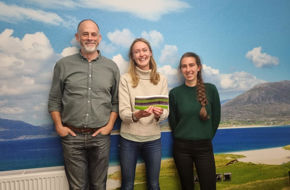Highlights
- Projects are certified to UK Woodland Carbon Code and IUCN Peatland Code.
- Provides finance to land managers to deliver environmental benefits that capture carbon.
- Collaboration with partners at Borders Forest Trust and Tweed Forum to deliver landscape level ecosystem restoration
- Utilizes a blend of public and private finance.

Forest Carbon is an environmental consultancy which brings carbon finance to land managers to drive ecosystem restoration in the UK. This work is supported by individuals, households and businesses who purchase these impacts as certified carbon credits from new woodland planting or peatland restoration projects.
This project also delivers a range of additional benefits to the local environment. Over the past 15 years Forest Carbon have supported the creation of 220 new woodlands, enabling the planting of more than 10M trees, which will sequester over 2.1 M tonnes CO2e over the projects’ lifespans.
Forest Carbon projects are certified to the internationally recognised UK Woodland Carbon Code or IUCN Peatland Code. The projects also stand to deliver many co-benefits, including supporting biodiversity, flood mitigation, tackling pollution and creating accessible green space for local communities.
Besides providing a service to larger businesses, Forest Carbon offers the Carbon Club, a service with a membership model, for individuals, households and SMEs. It allows people to sign up to an ongoing subscription service to address their carbon footprint on a monthly basis.
Forest Carbon then provides upfront funding to enable land managers to create and restore ecosystems that deliver carbon removal or emissions avoidance services. These projects would not have gone ahead without the access to carbon finance.
The Talla & Gameshope project is delivered in partnership with the Borders Forest Trust, which is undertaking the ecological restoration of three estates situated in the Borders. This fits with the aims of the Tweed Forum, which promote sustainable land and water management across the Tweed Catchment.
Peatland restoration was seen as a means of delivering significant carbon savings, as well as delivering ecological and hydrological benefits to the area. Degraded peatlands contribute as much as 5% of the UKs total carbon emissions, and so efforts to reduce this are essential. This project will prevent the release of more than 20,000 tonnes of CO2e over the next hundred years.
Preventing runoff from the peatland during heavy rainfall events will reduce erosion and help prevent flooding in the lower parts of the Tweed catchment. It will also improve the quality of the water in the nearby Talla reservoir, the water source for Edinburgh. The improved peatland functioning will also benefit flora and fauna in the area.
Forest Carbon provide an example of how businesses can mitigate their impacts through investment into UK nature restoration, in a way that brings wider environmental, ecological and social benefits.